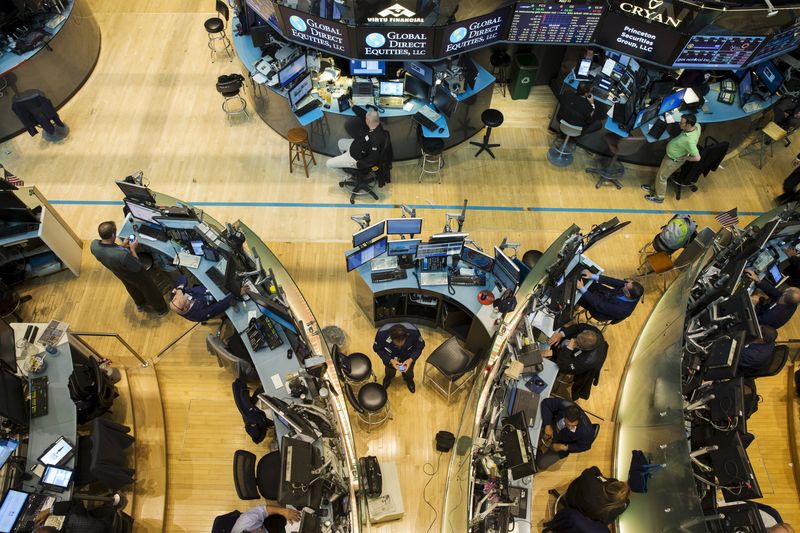By Geoffrey Smith
Investing.com -- The dollar edges lower after its worst one-day sell-off in months. The debate over inflation and interest rate hikes continues, however, with Philadelphia Fed President Patrick Harker saying he's open to more than three rate hikes this year and Lael Brainard due in the Senate for her confirmation hearing as vice-chair of the central bank. Delta Air Lines (NYSE:DAL) results may cast light on the impact of a rising wave of Covid-19 cases in the U.S., while another big car plant in one of China's most important ports shuts down due to you-know-what. Here's what you need to know in financial markets on Thursday, 13th January.
1. Dollar sell-off eases after greenback hits 2-month low
The dollar stabilized after its biggest daily drop in three months, a sign that global markets believe that the risks of tighter U.S. monetary policy are fully priced in for now.
By 6:15 AM ET (1115 GMT), the dollar index, which tracks the greenback against a basket of six advanced economies, was down 0.1% at 94.812, after falling more than 0.6% on Wednesday, on growing hopes that inflation may be close to peaking. Figures released on Wednesday had shown annual inflation up 7% on the year, its highest since 1982, but analysts argued that a combination of factors were making the situation look worse than it is.
Talk about tighter policy is unlikely to stop. Philadelphia Federal Reserve President Patrick Harker told the Financial Times in an interview that he’s open to more than three interest rate hikes this year, while Lael Brainard’s prepared remarks for her vice-chair confirmation hearing later Thursday stressed the paramount need to bring inflation down.
2. PPI, jobless claims due
Arguably a better measure of current inflation dynamics will be posted at 8:30 AM ET, when the U.S. publishes producer price inflation numbers for December.
Overall prices are expected to have risen 0.4% in the month, which would be their smallest monthly increase in a year, while core prices are expected to have risen 0.5%, a more modest slowdown after December’s shock acceleration.
U.S. jobless claims, due to be released at the same time, are expected to have stayed near post-pandemic lows last week at 200,000.
3. Stocks set to open a touch higher; Delta earnings in focus
U.S. stock markets are set to open mostly higher later, with risk appetite revived by the latest developments on the monetary policy front.
However, gains may be restrained by the consciousness that the shift in sentiment over interest rates has also been driven by the alarming spread of Covid-19 across the U.S. in the last two weeks, raising the likelihood of a short-term drag on growth. Delta Air Lines earnings, to be released early, may cast further light on that.
By 6:15 AM ET, Dow Jones futures were up 48 points, or 0.1%, while the S&P 500 futures contract and the Nasdaq 100 futures contracts were both up by a similar amount. Benchmark 10-year Treasury yields, meanwhile, appeared to have completed their short-term retracement, edging higher again to 1.75%.
Other stocks in focus may include Robinhood (NASDAQ:HOOD), which downplayed an apparently false rumor about it preparing to list contracts in ‘meme coin’ Shiba Inu.
4. New record for hospital admissions; China's port problems worsen
U.S. hospital admissions reached a new record high on Wednesday, making it increasingly clear that the greater transmissibility of the Omicron variant is largely offsetting what positives can be drawn from its weaker virulence.
Absenteeism remains an acute issue both in the U.S., which has averaged over 780,000 new cases a day for the last week despite a sharp drop on Wednesday, and further afield: France registered over 360,000 new cases for a second straight day on Wednesday, but is still relaxing travel restrictions with neighboring Britain, thinking that there is no point in adding economic harm to the situation when community spread is already so active.
Covid-related risks also continue to be evident in China, where Volkswagen (DE:VOWG_p) followed Toyota in closing two plants in the port of Tianjin. Disruptions at the ports of Tianjin, Dalian and Ningbo are leading to increased congestion at Shanghai, the world’s busiest port.
5. Oil hits two-month high as sellers run out of road
Crude oil prices rallied to their highest in two months, helped by a cheaper dollar and by indications that large consumer nations are running out of space to sell from their strategic reserves.
According to Tanker Trackers’ Samir Madani, the latest U.S. Energy Department sale reduces the Strategic Petroleum Reserve’s holdings to less than 100 days of import cover. International agreements require the U.S. and other advanced economies to hold at least 90 days’ worth of imports.
Wednesday’s government data on U.S. inventories, however, showed another large build in gasoline inventories, suggesting that pressure on final demand for fuel is building as the Omicron wave rises.
U.S. crude prices inched higher to $82.67 a barrel, while Brent rose 0.1% to $84.78 a barrel.
